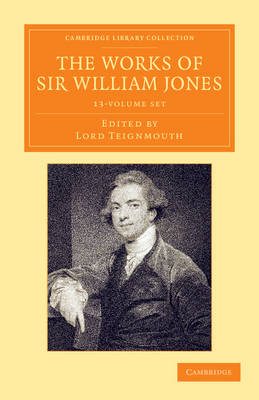Cambridge Library Collection - Perspectives from the Royal Asiatic Society
1 primary work • 2 total works
Volume 2
A renowned Enlightenment polymath, Sir William Jones (1746-94) was a lawyer, translator and poet who wrote authoritatively on politics, comparative linguistics and oriental literature. Known initially for his Persian translations and political radicalism, Jones became further celebrated for his study and translation of ancient Sanskrit texts following his appointment to the supreme court in Calcutta in 1783. He spent the next eleven years introducing Europe to the mysticism and rationality of Hinduism, becoming a pioneer in comparative religion. Through works such as his nine 'Hymns' to Hindu deities and his translation of the Sanskrit classic Sacontala, Jones inspired and influenced Romantic writers from William Blake to August Wilhelm Schlegel. These thirteen volumes of his works, published in 1807, begin with a memoir by his friend and editor Lord Teignmouth (1751-1834). Volume 2 covers Jones' life and death in India, and includes important correspondence and unpublished work.
A renowned Enlightenment polymath, Sir William Jones (1746-94) was a lawyer, translator and poet who wrote authoritatively on politics, comparative linguistics and oriental literature. Known initially for his Persian translations and political radicalism, Jones became further celebrated for his study and translation of ancient Sanskrit texts following his appointment to the supreme court in Calcutta in 1783. He spent the next eleven years introducing Europe to the mysticism and rationality of Hinduism, becoming a pioneer in comparative religion. Through works such as his nine 'Hymns' to Hindu deities and his translation of the Sanskrit classic Sacontala, Jones inspired and influenced Romantic writers from William Blake to August Wilhelm Schlegel. These thirteen volumes of his works, published in 1807, begin with a memoir by his friend and editor Lord Teignmouth (1751-1834).

